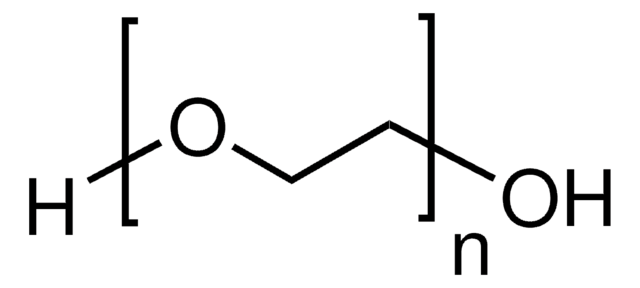202444
Poly(ethylene glycol)
average MN 3,350, hydroxyl, powder
Synonym(s):
Polyethylene glycol, PEG
Sign Into View Organizational & Contract Pricing
All Photos(3)
About This Item
Linear Formula:
H(OCH2CH2)nOH
CAS Number:
MDL number:
UNSPSC Code:
12352104
PubChem Substance ID:
NACRES:
NA.23
Recommended Products
Product Name
Poly(ethylene glycol), average Mn 3,350, powder
form
powder
Quality Level
mol wt
average Mn 3,350
pH
4.5-7.5
viscosity
90 cSt(210 °F) (99 °C)(lit.)
mp
54-58 °C (lit.)
density
1.204 g/mL at 25 °C
Ω-end
hydroxyl
α-end
hydroxyl
SMILES string
C(CO)O
InChI
1S/C2H6O2/c3-1-2-4/h3-4H,1-2H2
InChI key
LYCAIKOWRPUZTN-UHFFFAOYSA-N
Looking for similar products? Visit Product Comparison Guide
Related Categories
General description
Poly(ethylene glycol) (PEG) is a biocompatible inert synthetic polymer with repeating units of ether oxygen (-CH2-CH2-O-). It can be synthesized via anionic polymerization of ethylene oxide. It is extensively used in biological and medical applications due to its non-immunogenicity and high water solubility.
Application
PEG can be used to functionalize magnetite nanoparticles. The coating of the magnetic core with PEG provides good stabilization while maintaining the magnetic properties of the nanoparticles.
It can be used to modify the surface of photocatalytic TiO2 nanopowder for its application in self-cleaning paints. PEG-coated TiO2 nanopowder can be prepared under mild conditions and show excellent colloidal stability.
It can be used as a cross-linker to prepare poly(N-isopropylacrylamide) based thermosensitive injectable hydrogels. The addition of PEG improves the chemical and mechanical properties of hydrogel and prevents it from dissolving in the swelling medium. Owing to their biocompatibility and biodegradability, these hydrogels are widely used for biomedical applications.
It can be used to modify the surface of photocatalytic TiO2 nanopowder for its application in self-cleaning paints. PEG-coated TiO2 nanopowder can be prepared under mild conditions and show excellent colloidal stability.
It can be used as a cross-linker to prepare poly(N-isopropylacrylamide) based thermosensitive injectable hydrogels. The addition of PEG improves the chemical and mechanical properties of hydrogel and prevents it from dissolving in the swelling medium. Owing to their biocompatibility and biodegradability, these hydrogels are widely used for biomedical applications.
Features and Benefits
- High structural flexibility
- Biocompatibility
- High hydration capacity
- Devoid of any steric hindrance
Other Notes
Molecular weight: Mn 3,015-3,685
related product
Product No.
Description
Pricing
Storage Class Code
11 - Combustible Solids
WGK
WGK 1
Flash Point(F)
Not applicable
Flash Point(C)
Not applicable
Personal Protective Equipment
dust mask type N95 (US), Eyeshields, Gloves
Choose from one of the most recent versions:
Already Own This Product?
Find documentation for the products that you have recently purchased in the Document Library.
Customers Also Viewed
Our team of scientists has experience in all areas of research including Life Science, Material Science, Chemical Synthesis, Chromatography, Analytical and many others.
Contact Technical Service

![1,8-Diazabicyclo[5.4.0]undec-7-ene 98%](/deepweb/assets/sigmaaldrich/product/structures/120/564/5b373e23-1624-489c-8efb-692de0f96ffb/640/5b373e23-1624-489c-8efb-692de0f96ffb.png)


